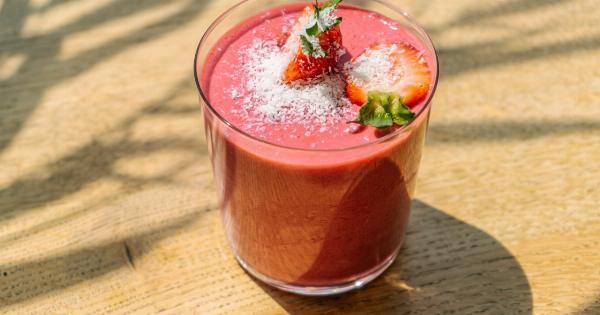Taking a shower is an essential part of our daily routine, providing us with a refreshing start to our day or a relaxing way to unwind before bed.
However, have you ever stopped to consider the impact that the temperature of your shower can have on your overall health? Believe it or not, the temperature of your shower can play a significant role in promoting a healthy body and mind. In this article, we will explore the best shower temperature for your health, backed by scientific research and expert opinions.
Why does shower temperature matter?
Before diving into the ideal shower temperature, it’s crucial to understand why the temperature of your shower has an impact on your health. Our skin is the largest organ in our body and plays a vital role in maintaining our overall well-being.
The temperature of the water we expose our skin to can affect its function and the way our body responds to the stimuli.
The benefits of warm showers
Warm showers are a popular choice for many, and there are numerous health benefits associated with them. Firstly, warm water helps in relieving muscle tension and promoting relaxation.
It can be especially beneficial for individuals suffering from muscle soreness, stiffness, or arthritis. The warmth of the water improves blood circulation and allows the muscles to relax, reducing pain and promoting faster recovery.
Moreover, warm showers can be highly effective in reducing stress levels.
The soothing sensation of warm water on the body triggers the release of endorphins, also known as “feel-good hormones.” Endorphins help improve mood, decrease anxiety, and promote a sense of well-being.
Warm showers can also aid in promoting a better night’s sleep. The rise in body temperature during the shower followed by a subsequent decrease afterward can act as a natural sleep inducer.
Taking a warm shower before bedtime can signal the body that it’s time to rest, leading to improved sleep quality.
The advantages of cold showers
While many people prefer warm showers, cold showers have their own set of unique benefits that shouldn’t be overlooked. One of the most significant advantages of cold showers is their ability to invigorate and rejuvenate the body.
When your body is exposed to cold water, it triggers a rush of adrenaline and increases the release of noradrenaline, resulting in heightened alertness and an energy boost.
Cold showers can also improve circulation and support healthy skin. The cold water causes blood vessels to constrict, which can help reduce inflammation and puffiness in the skin.
Additionally, cold showers can promote healthier hair by sealing the hair cuticles, making your locks look shinier and less prone to breakage.
Another remarkable benefit of cold showers is their impact on the immune system. Research suggests that exposing your body to cold water stimulates the production of white blood cells, which are crucial for fighting off infections and diseases.
Cold showers can enhance your body’s resistance to common colds and boost your overall immunity.
The ideal shower temperature for your health
While both warm and cold showers offer their own unique advantages, finding the optimal temperature is key to maximizing the health benefits. The ideal shower temperature for most individuals is lukewarm water.
Lukewarm water, typically around 98-102°F (36-39°C), strikes a perfect balance for maintaining healthy skin, improving blood circulation, and promoting relaxation. It is neither too hot nor too cold, preventing excessive dryness or damage to the skin.
It’s important to note that the ideal shower temperature can vary depending on individual preferences, climate, and health conditions.
For those seeking the benefits of warm showers, a temperature range of 100-105°F (38-41°C) is generally recommended. However, be cautious not to exceed this temperature to avoid scalding or drying out your skin.
If you are inclined towards cold showers, a temperature range of 60-70°F (15-21°C) is considered invigorating and beneficial for most individuals.
However, individuals with certain health conditions such as Raynaud’s disease or asthma should avoid prolonged exposure to extremely cold water, as it may trigger symptoms.
Tips for optimal shower experience
Regardless of the temperature you choose, there are additional tips to ensure an optimal shower experience for your health:.
- Keep showers to a reasonable length: Prolonged exposure to hot water can strip away natural oils from your skin, causing dryness. Limit your showers to 10-15 minutes.
- Moisturize after showers: Applying a good quality moisturizer within a few minutes of drying off can help lock in moisture and keep your skin hydrated.
- Gradually adjust water temperature: Avoid sudden changes in water temperature, as it can be a shock to your body. Gradually adjust the temperature to give your body time to adapt.
- Be cautious with extreme temperatures: While hot or cold showers can be invigorating, extremes in temperature can be harmful. Avoid scalding hot water or icy cold water for prolonged periods.
- Consider the climate: If you live in a cold climate, a warm shower can help raise your body temperature and prevent discomfort. Conversely, in hot climates, a cooler shower might be more refreshing.
- Personalize your experience: Experiment with different shower temperatures to find what works best for you. Pay attention to how your body responds and adjust accordingly.
Conclusion
Your showering habits can have a significant impact on your overall health. While there are benefits associated with both warm and cold showers, the ideal temperature for most individuals is lukewarm water.
Lukewarm showers offer a perfect balance of relaxation, improved blood circulation, and healthy skin maintenance. However, personal preferences, health conditions, and climate can influence the optimal temperature for each individual. Whether you prefer warm or cold showers, it’s important to listen to your body and adjust accordingly.
By finding the perfect shower temperature, you can enhance your well-being and make the most out of this daily ritual.
























